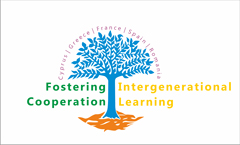Meeting Notes : June 4, 2013
Practical/Theoretical Discussion (led mainly by ES and CY):
The meeting started with a discussion on new intergenerational dynamic: younger people now more often staying at home with/dependent upon their parents. This becoming a European-wide phenomenon, originating more so in Southern European countries and spreading to the north of Europe as well = relevance to project objectives: reinforcing bonds between generations. Related to overall issue of unemployment, especially that of youth.
Presentation of the Spanish organization: Speaking of economical crisis, unemployment, feelings that occur in Southern Europe, problem of youngsters facing these problems, being dependent on older generations. South of Spain is poorer, there are good universities but not enough jobs. In their region there is 28% unemployment.
In Spain, partner school striving to offer free courses («charitable» aspect of religious/Catholic basis of school) to parents as well as children.
Spanish school currently promoting importance of language, especially English, to both parents and their children (with morning and afternoon sessions: one for parents and one for children) – relevant to today’s marketplace.
They use the same teachers for these classes, thus building a good rapport and trust among teachers, parents and children and through teacher observations, providing input into improving family relationships between young and old.
Mobilities:
ES missed the first 2 meetings: this led to a discussion on need for a balanced ratio between staff and learners. We need to think about the number of mobilities that we will need to reach, the number of mobilities per trips is also decided according to the destination (how far it is, how long it should be, how much the trip and hotel cost…). If too expensive, there will be fewer people coming.
What have been done and decided so far:
- 1st meeting in Cyprus: what we will do during the whole project has been decided
- We all researched and wrote a report on what is the intergenerational situation in our countries. Moreover, it is important to share our best practices, our different activities in intergenerational learning, take note on it…
- 2nd meeting in Greece: we observe some of the activities conducted in Kilkis (art, music…)
- We all gave a contribution about IGN activities in our countries. A newsletter with contributions from every partner has been created. The newsletter has been downloaded on the website.
- Best practice guide will be produced, Cypriots and the rest of the partners started to work on it.
Presentation of IGN activities
Greece, Romania will send them by mail a PPT presentation of their activities. (Romania: 1 sport activity: walking trip, cultural activity: with a German group (German learners), Greece: cultural annual event, elderly and young, took part of the celebration of the municipality of Kilkis (in one village), exchange of habits. Different activities (young drummers, people wearing traditional costumes…). Every generation is present, way to pass on the knowledge, the traditions
Spanish partner has practice with youngsters but also parents. Not the same way of teaching, not the same relationship. The parents are really involved in classes, most of them are unemployed, they are getting prepared to pass a language test (Cambridge…). It is easier to discuss with the teacher about their children, because they know about the teacher.
The French partner is more and more involved in IGN activities, lot of them include ICTs (discussion between generations on existed technologies during the time of the grand-parents and current technologies), video games, key sentences on what seniors think about young generations and vice-versa, etc.
Discussion on Empowerment (comments by CY and FR):
- Suggested that during implementation of intergenerational activities, importance should be given to the process of empowerment = to have the feeling that one is doing something important (which an individual feels on an emotional level).
- By teaching/sharing knowledge, this empowerment (or creation of a good feeling in the immediate term and that of self-esteem in the long term) can promote both emotional and physical well-being.
- It was pointed out that a volunteer in this process might even obtain a greater feeling of empowerment (feel even better as a result of their participation) than would a salaried employee, due to the «costs» of contractual obligations/constraints felt by the latter.
- IGN learning should be informal but structured, people should have fun doing this and be able to be emotionally involved: small groups, pairs: young people have skills (such as ICTs), older people have experience and should be able to pass it on. In helping another generation, we also feel useful and then better.
Next steps:
- Interim reports have to be filled and sent to our national agencies; CY coordinator may work on “common part” for all partners
- Evaluation of the KO meeting has to be sent to the coordinator (2nd meeting done)
- Contribute regularly to the website (articles, updates, material…) and the blog, every partners should test their accessibility to them
- Start thinking to the 2nd newsletter content
- Contribute to the IGN situation report (Best practice Guide, 1st part)
- Leaflet + poster will be create
- Discussion about space limitations of Dropbox — possible move to Google Drive
Next meeting:
Spain, Granada at the end of October 2013 (Meeting 29/30)
Romania, Craiova: end April/beginning May 2014
June 5, 2013
Study visit:
E-Seniors association (linked to E-Juniors association) and the Pôle Acti Seniors of the town hall of the 4th arrondissement of Paris implemented an IGN activity based on games. Seniors and children had to play by pairs in a tournament. They could play different kinds of games: Wii, quizzes on computers, Connect 4… Our partners could (and some did!)take part in the tournament.

RESULTS AND OUTCOMES
Best Practice GuideDissemination
3rd Project Newsletter2nd Project Newsletter
1st Project Newsletter
Project Leaflet
Project Poster
IGL & Communication (Greece)
IGL Activities (Greece)
Events
Intergenerational 2014 (FRANCE) Intergenerational 2013 (FRANCE)Intergenerational 2012 (FRANCE)
